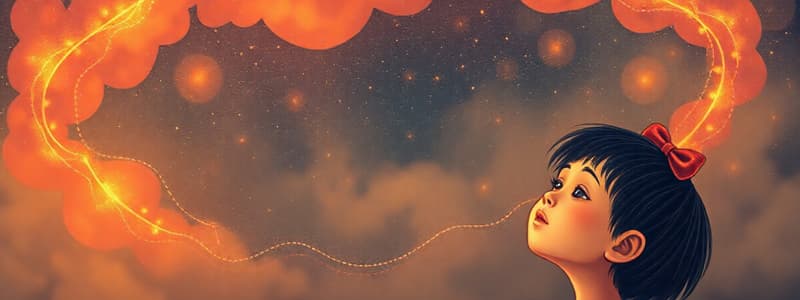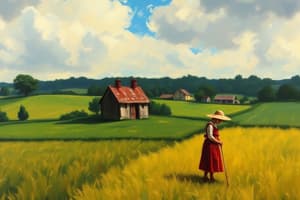Podcast
Questions and Answers
What did Malala want to erase with the imaginary magic pencil?
What did Malala want to erase with the imaginary magic pencil?
- The boys fishing in the pile for metal
- The children sorting rubbish into piles
- Her shoes that she didn't want to get dirty
- The smell, the rats, the giant mountain of rotting food (correct)
What was Malala's initial belief about the magic pencil?
What was Malala's initial belief about the magic pencil?
- It could protect people who were in danger
- It could erase the poverty of the children at the dump
- It could save people from getting sick
- It could make anyone happy (correct)
Why did Malala's father tell her that the children at the dump weren't in school?
Why did Malala's father tell her that the children at the dump weren't in school?
- He didn't want them to get their clothes dirty
- He knew they were too lazy to learn
- He was worried about the dangers at the dump
- They were working to support their families (correct)
What realization did Malala have after meeting the children at the dump?
What realization did Malala have after meeting the children at the dump?
How did Malala's father react to seeing the children at the dump?
How did Malala's father react to seeing the children at the dump?
What did Malala believe was the reason for seeing the children at the dump?
What did Malala believe was the reason for seeing the children at the dump?
How did Malala's views on changing the world shift after meeting the children at the dump?
How did Malala's views on changing the world shift after meeting the children at the dump?
What was the main reason Malala's family could afford a TV when she was eight years old?
What was the main reason Malala's family could afford a TV when she was eight years old?
What was the magnitude of the earthquake that devastated parts of Pakistan?
What was the magnitude of the earthquake that devastated parts of Pakistan?
Which of these places was NOT directly affected by the earthquake?
Which of these places was NOT directly affected by the earthquake?
What did the people of Shangla do when the earthquake hit?
What did the people of Shangla do when the earthquake hit?
Who was the leader of the Tehrik-e-Nifaz-e-Sharia-e-Mohammadi (TNSM)?
Who was the leader of the Tehrik-e-Nifaz-e-Sharia-e-Mohammadi (TNSM)?
What did the TNSM do to help after the earthquake?
What did the TNSM do to help after the earthquake?
What was the TNSM's message about the earthquake?
What was the TNSM's message about the earthquake?
How did the earthquake impact the lives of orphans?
How did the earthquake impact the lives of orphans?
Who threatened the girls' high school and why?
Who threatened the girls' high school and why?
What was a source of pride for the narrator during her primary school years?
What was a source of pride for the narrator during her primary school years?
How did the narrator feel when Malka-e-Noor won first place?
How did the narrator feel when Malka-e-Noor won first place?
What did the narrator's father teach her about competition?
What did the narrator's father teach her about competition?
What were the main concerns for the narrator and her friends after school hours?
What were the main concerns for the narrator and her friends after school hours?
What was the environment like inside the Khushal School for the girls?
What was the environment like inside the Khushal School for the girls?
How did the narrator describe the outside world in contrast to the Khushal School?
How did the narrator describe the outside world in contrast to the Khushal School?
What did the narrator and her peers enjoy in their educational environment?
What did the narrator and her peers enjoy in their educational environment?
What characteristic did the narrator attribute to her friendship with Moniba?
What characteristic did the narrator attribute to her friendship with Moniba?
What was the mufti's main objection to the school?
What was the mufti's main objection to the school?
What did the author learn at the madrasa?
What did the author learn at the madrasa?
What did the other boy say to the author about his school?
What did the other boy say to the author about his school?
What did the author's father do to resolve the conflict with the mufti?
What did the author's father do to resolve the conflict with the mufti?
What was the mufti's attitude towards the author's father?
What was the mufti's attitude towards the author's father?
How can a Pashtun man be characterized, according to the author?
How can a Pashtun man be characterized, according to the author?
What is the significance of the madrasa in the author's life?
What is the significance of the madrasa in the author's life?
Why was the author's teacher at the madrasa a woman?
Why was the author's teacher at the madrasa a woman?
What did the narrator float down the stream in hopes of reaching God?
What did the narrator float down the stream in hopes of reaching God?
Why did the narrator's mother put bread crusts on the windowsill?
Why did the narrator's mother put bread crusts on the windowsill?
How did the narrator's father contribute to the community?
How did the narrator's father contribute to the community?
What natural disaster did the narrator experience while in school?
What natural disaster did the narrator experience while in school?
What was the narrator's mother doing during the earthquake?
What was the narrator's mother doing during the earthquake?
Why did the narrator's mother want to serve breakfast to girls each day?
Why did the narrator's mother want to serve breakfast to girls each day?
Flashcards
The Magic Pencil Solution
The Magic Pencil Solution
The belief that a magical object, like a pencil, can solve any problem or make everything perfect.
Beyond the Magic Pencil
Beyond the Magic Pencil
The realization that problems are complex and require more than just a magical solution to fix.
Children at the Dump
Children at the Dump
Children who work in the dump to help their families, showing the harsh realities of poverty.
The Struggle for Survival
The Struggle for Survival
Signup and view all the flashcards
Showing Compassion
Showing Compassion
Signup and view all the flashcards
Taking Action
Taking Action
Signup and view all the flashcards
Learning from Experience
Learning from Experience
Signup and view all the flashcards
Good for Every Evil
Good for Every Evil
Signup and view all the flashcards
Sharing What We Have
Sharing What We Have
Signup and view all the flashcards
The Family of Seven
The Family of Seven
Signup and view all the flashcards
The Earthquake of 2005
The Earthquake of 2005
Signup and view all the flashcards
Upset by the Earthquake
Upset by the Earthquake
Signup and view all the flashcards
Earthquake of 8 Magnitude
Earthquake of 8 Magnitude
Signup and view all the flashcards
Aftershocks
Aftershocks
Signup and view all the flashcards
Miss Ulfat
Miss Ulfat
Signup and view all the flashcards
Chicks Around a Mother Hen
Chicks Around a Mother Hen
Signup and view all the flashcards
Earthquake
Earthquake
Signup and view all the flashcards
Richter scale
Richter scale
Signup and view all the flashcards
Tehrik-e-Nifaz-e-Sharia-e-Mohammadi (TNSM)
Tehrik-e-Nifaz-e-Sharia-e-Mohammadi (TNSM)
Signup and view all the flashcards
Exploiting vulnerability
Exploiting vulnerability
Signup and view all the flashcards
Opposition to girls' education
Opposition to girls' education
Signup and view all the flashcards
Mufti
Mufti
Signup and view all the flashcards
Blasphemy
Blasphemy
Signup and view all the flashcards
Maulana
Maulana
Signup and view all the flashcards
Purdah
Purdah
Signup and view all the flashcards
Un-Islamic
Un-Islamic
Signup and view all the flashcards
Madrasa
Madrasa
Signup and view all the flashcards
Quran
Quran
Signup and view all the flashcards
Arabic Alphabet
Arabic Alphabet
Signup and view all the flashcards
Cricket
Cricket
Signup and view all the flashcards
Khushal School
Khushal School
Signup and view all the flashcards
It's a good thing to come in second.
It's a good thing to come in second.
Signup and view all the flashcards
Malka-e-Noor winning first place.
Malka-e-Noor winning first place.
Signup and view all the flashcards
I worked extra hard so I would never have to learn that particular lesson again.
I worked extra hard so I would never have to learn that particular lesson again.
Signup and view all the flashcards
Moniba
Moniba
Signup and view all the flashcards
The bus, at recess, in the classroom
The bus, at recess, in the classroom
Signup and view all the flashcards
We flew on wings of knowledge.
We flew on wings of knowledge.
Signup and view all the flashcards
We ran as free as the wind.
We ran as free as the wind.
Signup and view all the flashcards
Study Notes
A Magic Pencil
- The narrator's father had eight hundred students and three campuses, including an elementary division and two high schools.
- The family finally had enough money to buy a TV.
- The narrator became obsessed with owning a magic pencil, inspired by a TV show character, Sanju.
- Sanju could create things by drawing them, like food or a policeman.
- The narrator prayed to God for a magic pencil.
- The narrator checked their cupboard every night but never found the pencil.
Observing Children at the Dump
- One afternoon, the narrator's mother asked them to throw away some potato peels and eggshells.
- The narrator saw a girl sorting trash, her skin covered in sores.
- Other children were fishing for metal using magnets.
- The narrator's father was told about the children at the dump.
- The father spoke gently to the children but they ran away.
- The children were supporting their families by selling items they found.
- The narrator's father noticed the children's tears.
Sharing and Helping Others
- The narrator's mother put bread crusts in a bowl on the kitchen windowsill, for the birds.
- The narrator's mother kept extra rice and chicken for a poor family.
- The narrator asked their mother why she shared food, and their mother explained they must not forget to share with those who are hungry.
- The family shared everything they had, helping a family of seven.
- The father helped a family who had fallen on hard times by lending them money and giving free places in school to children in need.
- Their mother gave breakfast to some girls each day.
Warning from God
- The narrator was in primary school when the ground trembled and shook.
- The building continued to shake.
- The earthquake was of the intensity 7.6 on the Richter scale.
- The earthquake was one of the worst in history, felt as far away as Kabul and Delhi.
- The earthquake devastated northern areas of Pakistan including Shangla.
- People feared the earthquake was the end of the world.
- People were terrified, and then waited for help.
The First Direct Threat
- A man, described as a mufti, and other elders came to the narrator's home.
- The mufti complained about girls using the same gate as men.
- The mufti and elders said that the girls' high school was a blasphemy.
- The girls should go into purdah (religious seclusion).
Studying That Suits You
Use AI to generate personalized quizzes and flashcards to suit your learning preferences.




